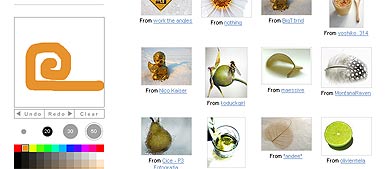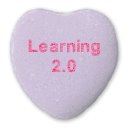Tuesday, December 19, 2006
#16 - Wikis
This has some good before and against points, which I'll drop here:
FOR
Easy to use
Web-based
Simple syntax (don't need to know HTML)
Anyone can make changes -- no more waiting for the Webmaster to get around to your requested changes.
Many free and open source options
Flexible and extensible
AGAINST
Too open -- "I don't want someone changing my writing!"
Disorganized
Vandalism and spam
Having set up a wiki or 2, I'd have to say that battling with the wiki syntax after years of pure HTML is not easy (personally). It can be a steep learning curve, and this is probably why the freebie places offering full set up are popular.
FOr library use, the most obvious wiki use is a readers advisory that can be tailored to the actual collection. It's great to draw resources from general adivsories, but there's no point getting people all excited about a book there's no copies of in the collection.
Tuesday, December 12, 2006
#15 - Perspectives
We need to focus our efforts not on teaching research skills but on
eliminating the barriers that exist between patrons and the information they
need, so they can spend as little time as possible wrestling with lousy search
interfaces and as much time as possible actually reading and learning.
This is so true. I can remember going to the Eltham library when I was 9 or 10 and doing searches for Mum who said she couldn't find a book because she couldn't think like a computer. Much of Web1.0 was like that - if you weren't a natural born geek or couldn't learn how to do it the computer's way, it was never going to work for you. These days, search tools are more intuitive, acting much like people expect them to (most people anyway) but there's still room for improvement within everything from the library cataloge to the databases to... name it.
People need to be able to sit down, find what they need and feel confident in doing so.
Dr Wendy Shultz offers this exciting thought:
There are SecondLife3 subscribers who spend more than forty hours a week online, immersed in its virtual graphic world. Digital natives take 2.0 for granted; they are buzzing over Web 3D. Carrying Chad and Miller’s argument through this next phase transition, we arrive at virtual collections in the 3D world, where books themselves may have avatars and online personalities. But the avalanche of material available will put a premium on service, on tailoring information to needs, and on developing participatory relationships with customers. So while books may get in your 3D face all by themselves, people will prefer personal introductions—they will want a VR info coach. Who’s the best librarian avatar? How many Amazon stars has your avatar collected from satisfied customers? This could create librarian “superstars” based on buzz and customer ratings. People will collect librarians rather than books—the ability not just to organise, but also to annotate and compare books and other information sources, from a variety of useful perspectives.
As one of the "Digital Natives" all I can say is - sign me up! The potential would be huge!
#14 Technorati
Again, the tagging does make for an easy browsing experience. It relies on the honor system (as does much of Web 2.0) in that people who tag tend to tag correctly (not adding "shoes" as a tag to a post about suitcases, for example). There's always going to be hit and miss with people seeing their tags as applicable when other people don't.
Nothing seems surprising in the popular searches - both Britney Spears and Christmas are in the top 15. I'm happy to spot multiple word tags (whoo!).
Friday, December 08, 2006
#13 Deli.cio.us
Monday, October 30, 2006
Week 5 Item #12 - Rollyo
So, being the adventurous type I picked up a roll someone had created for "World of Warcraft" (yes, I'm a WoW geek, or actually I'm NOT a geek, I'm a level 36 Hunter). Heading back to my personalised search page, thing started to make a little more sense. There was the WoW option right under the search bar. NOW I get it!
My profile is here, I made a search roll with three sites about frogs.
I can see the potential use of this, especially for those things people tend to search all the time such as general hobbies or interests, and it is certainly faster than going to 8 or 10 sites ad searching them one at a time.
Within the library, searchrolls could be linked to for homework help (for example), giving the student more flexibilty in what they search for but still maintaining a level of quality in links.
Monday, October 23, 2006
Week #4 Item #11 - Library Thing
Adding books to your profile is as simple as searching for a title or author just like we do on amazon or anywhere else - in face the book information and covers are pulled from amazon by default. If Amazon fails (for out of print books generally) there are more than 60 other places to search and if all THAT fails, you can manually enter the book into the database.
Once added, you'll see how many other people have added the same book. My "other people" numbers go from 2888 for "Hitch Hikers Guide to the Galaxy" to 2 for "The Year of the Cornflake".
The interface is really clean and intuiative, things are exactly where you'd expect them to be and it's coded in a way to make the pages load quickly. Each title has an information page including reader reviews and ratings, recommended titles and titles by the same author, which would make it handy for building a collection of, for example, Terry Pratchett.
I do notice the conversation button on the information pages is a little hit and miss, but still not a bad way to turn up forum posts. There's also a link to several (fabulously exciting imho) Book Swap services online.
My Book Thing cataloge can be found here, plus there's a widget in my sidebar.
Week #5, Item 10 - Play Around with An online Image generator
(ignore this line, I'm trying to fix a text display problem)
Week #4 Cont - Locate a few Useful Library Feeds (9)
- Pop Goes The Library looks at using Pop Culture to encourage library awareness and use.
- Librarian In Black looks at many aspects of the information world.
- Unshelved is a comic strip - about libraries, so it counts!
Wednesday, October 18, 2006
Week #4 - RSS and Newsfeeds.
Bloglines is a lot easier to use than I thought it would be, it really is a matter of searching, then clicking a link and voila! Since most packaged blogging software comes with built in feeds these days (unless you're building your blog by hand, and why would you?!), just about any blog is available on the service - including this one haha.
Bloglines also offers buttons for people to add to their blogs to encourage people to subscribe via the service, and a browser add on for most major browsers to create a toolbar button for instant subscriptions as you surf - very handy.
My subscriptions can be found here.
Monday, October 16, 2006
Week #3 Continued: Write a blog post about something technology related
Having looked over the Entropia website, I admit I'm fascinated by the idea of virtual currency (the Project Entropia Dollar or PED) having an exchange rate with the US dollar. The idea isn't new to me as the online game Second Life also has a currency than can be bought and sold for real cash, some people make their entire living from selling things in the game.
The difference seems to be that money in Second Life is earned though pure creativity - making and selling clothes, furniture, avatars, hair etc - or pure business sense - buying land low and selling it high for example. Entropia looks to be limited to a set list of items you can "make" and "sell" through crafting.
(Crafting works by collecting items needed to create something, then ... well making it really. Great example, huh?).
What has me really interested in Entropia is the Cash Card. While I know of a lot of people who make a lot of money playing these online games, Entropia appears to be the first to give access to in game money via a real world ATM.
The process needs you to log into the game and transfer a portion of your in game bank account to a special account, still in game. Then, with your cash card you can go to any ATM that supports Mastro or Cirrus transactions and withdraw the money for the fixed exchange rate of 10 PED to US$1. Of course there are fees and charges, what's free these days?
To move back to Second Life as an example - artists and writers have used this virtual world since it's inception to get coverage of their work, to promote new works and make money from the sale of text or graphical art (or in world sculpture). Money made in Second Life is sold on a stock exchange, with the amount you make being credited to your credit card or paypal account. If Second Life could also create a card like the Cash Card, it would be an incredible bonus to those who use SL as their main income source.
I'm just finding the new stages of virtual life/ real life crossovers to be fascinating and very exciting, the possiblities are amazing.
Sunday, October 15, 2006
Week #3 - Photos and Images
I find flickr to be mostly handy, though the login process could be a little more inituitve. I mostly like the streams and sharing aspects of the service. A group of friends can all pool their photos from an event, or a group of strangers can share their dog photos or whatever.
6. Playing with the Flickr tools is timewasting fun, and I think my favourite is Retrievr. You make a simple sketch in a box and it pulls matching images from flickr. It's not really Firefox compatable though, but you can't have everything.
 Some of the matches are a little off, but it's still interesting and mildly addictive!
Some of the matches are a little off, but it's still interesting and mildly addictive!Saturday, October 14, 2006
Week #2 - Blogging
Since I'm so familier with the blogging process and tools, I thought I'd be daring and sign this blog up as part of the Blogger beta test. So far it's behaving much the same as ordinary blogger, but with a few more fun toys which I'm sure I'll get to play with as we go.
4. Yup, sent the blog link to Lynette. Hi Lynette!
Week #1 - Introduction
2. The presentation on Lifelong Learning was interesting. I can see where I've fallen into the traps of closing off from learning much of anything useful.
Of the habits, I think I'll have the least trouble with Using Technology as I've always been a bit of a technogeek (just a little bit...) and have enjoyed finding and learning new technologies and services. The habit I think will be hardest to adopt is having confidence in myself, but I really liked the line "Don't say it or think it unless you want it to be true". Applies to so much in life.



